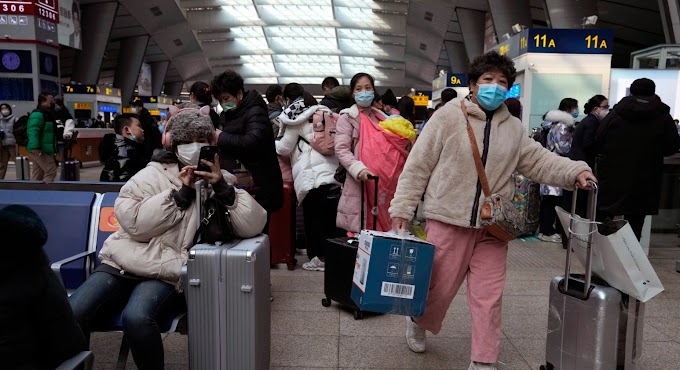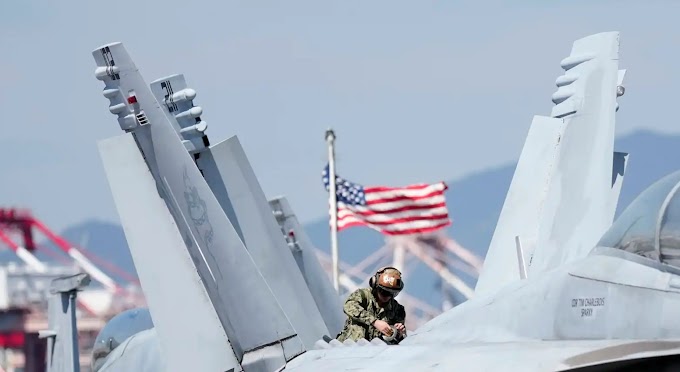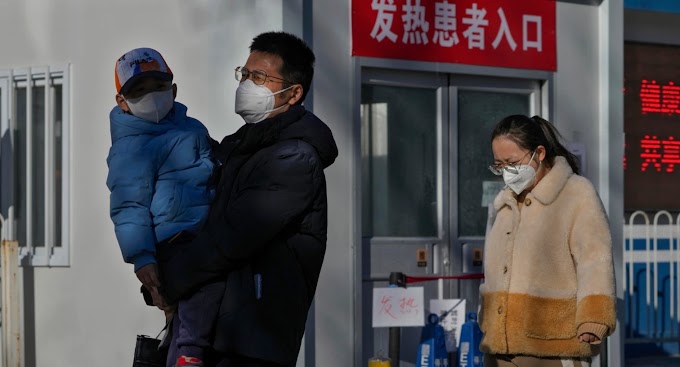Year-end report: The crisis in the Taiwan Strait is rising? The CCP will be the toughest against Taiwan in 2022, and the number of warplanes disrupting Taiwan will break the table.
 |
| Schematic diagram of large-scale military exercises held by the Chinese army around Taiwan |
Cross-strait relations will fall to the bottom again in 2022. In terms of the scale of the CCP’s military aircraft disrupting Taiwan, more than 1,500 PLA fighter planes have flown over the air defense identification zone southwest of Taiwan this year, the highest in history. After the CCP held a large-scale military exercise against Taiwan in early August, in October it included its determination to "contain Taiwan independence" into the party constitution, and in December it unilaterally banned Taiwan's agricultural and fishery products from being imported into China. Analysts pointed out that the CCP's frequent moves to tear apart Taiwan's interior may be just the beginning.
2022 is the year when the CCP will be toughest in Taiwan. The scale of the CCP’s military aircraft harassing Taiwan exceeds 1,500, an unprecedented number.
 |
| Chinese troops hold live-fire drills on Pingtan Island in Fujian Province, near Taiwan. (August 4, 2022) |
According to expert analysis, international geopolitical factors are also involved behind the CCP’s tough approach to Taiwan. Beginning with the Russo-Ukraine war that broke out in February this year, the resounding voice of democracy in the world has indirectly affected the strengthening of Western support for Taiwan, triggering a negative reaction from the CCP. Backlash, including fierce retaliation, including holding military exercises against Taiwan after US House Speaker Nancy Pelosi visited Taiwan in early August.
However, after Taiwan’s ruling party, the Democratic Progressive Party, was defeated in the nine-in-one local elections at the end of November, the Chinese Communist Party has ignited the hope that the two sides of the strait can resume negotiations under the leadership of the Kuomintang, adding another variable to the future trend of the two sides of the strait.
 |
| In the nine-in-one election on November 26, 2022, KMT candidate Jiang Wanan (middle) won the mayoral election in Taipei. |
Analysts believe the CCP is still using soft and hard strategies toward Taiwan. Even if there is a possibility of resuming negotiations, the CCP should first wage an "economic war" against Taiwan. And other products are exported to China, in order to severely damage the confidence of the people of Taiwan in the DPP government.
 |
| John Dotson, deputy director of the Center for Global Taiwan Studies in Washington (Photo courtesy of Dotson Cheng) |
In an interview with Voice of America, John Dotson, deputy director of the Global Center for Taiwan Studies in Washington, said that Chinese President Xi Jinping’s “Five Points from Xi” as early as the 40th anniversary of the “Message to Compatriots in Taiwan” published in early 2019 , has clearly adjusted cross-strait relations and the 1992 consensus to "both sides of the strait belong to one China and work together to seek national reunification" and adhere to the basic policy of "one country, two systems".
Xi Jinping reiterated that he "does not promise to renounce the use of force, and reserves the option to take all necessary measures."
Zheng Zhexuan said that after this statement, the CCP’s approach to Taiwan became clearer,
and the number of CCP military planes intruding into the Southwest Air Identification Zone of Taiwan and flying over the center line of the Strait began to increase sharply. Over the years, they have also frequently crossed the border, which means that the patrol force of the Taiwan Coast Guard Agency is exhausted.
According to Taiwan’s Ministry of National Defense, since March 2019, Chinese military planes invaded Taiwan’s Southwest Air Defense Identification Zone for the first time. In that year, about 10 military planes harassed Taiwan. In 2020, the number increased to about 380 sorties, and in 2021, there were as many as 958 sorties. As for this year, as of December 1, the cumulative number of military aircraft that harassed Taiwan has reached 1,526, and 243 days have entered Taiwan's airspace. "Taiwan interference has become normalized."
Zheng Zhexuan said: "After Xi Jinping gave a speech on Taiwan policy in early 2019, it seemed at that point in time that he decided to start putting pressure on Taiwan, and the voice for reunification was getting louder and louder. I think in the past year, this pressure has become more and more serious. It's getting bigger and bigger, and not only military interference, but also attempts to disinformation in online media and digital media, etc., have become more intense, but I don't think this is a change of direction, it (the CCP) is just a continuation of an A pattern that has been around for a while.”
2022 is the year when the CCP will be toughest in Taiwan
In early August this year, after Pelosi, Speaker of the U.S. House of Representatives, visited Taiwan, the CCP immediately held a live-fire military exercise around Taiwan. Part of the exercise area not only covered Taiwan’s territorial waters but also fired four missiles over the northern part of Taiwan. Most provocative act.
 |
| Speaker of the U.S. House of Representatives Nancy Pelosi speaks during a meeting with Taiwan President Tsai Ing-wen in Taipei. (August 3, 2022) |
At the 20th National Congress in mid-October, the CCP also revised the party constitution, changing the original "one country, two systems" policy towards Taiwan to a more forceful tone of "comprehensively, accurately, and unswervingly implementing the 'one country, two systems' policy" and adding "resolutely oppose and containment of Taiwan independence".
In this regard, Zheng Zhexuan said that the top leaders of the CCP have a very clear attitude towards Taiwan and will not give Taiwan or the government of the Republic of China any political legitimacy. can be unified.
Zheng Zhexuan said: "I don't think that a military conflict is imminent, but the situation does become more dangerous every year. As the Chinese Communist Party's military capabilities grow and increase its intention to annex Taiwan by force, I think the prospects for future reunification grow every year."
A special year of the Russia-Ukraine war strengthens Western support for Taiwan
Lin Wencheng, a professor at the Institute of China and Asia-Pacific Regions at Sun Yat-sen University in Kaohsiung, southern Taiwan, said in an interview with Voice of America that this year is a very special year for cross-strait relations because of the evolution of international situation. For example, the war between Russia and Ukraine began this year in February continues to this day, and the 20th National Congress of the Communist Party of China approved Xi Jinping's third term as General Secretary of the Communist Party of China.
 |
| Lin Wencheng, a professor at the Institute of China and Asia-Pacific Studies at Sun Yat-sen University in Kaohsiung, southern Taiwan (Photo courtesy of Lin Wencheng) |
Lin Wencheng said that the Russo-Ukraine war has led to an increase in distrust of China in Western countries led by the United States, which indirectly strengthened their support for Taiwan. Although cross-Strait relations have seriously deteriorated this year, Lin Wencheng said that after Pelosi's visit to Taiwan, the CCP's military drills are just the effect of Xi Jinping's internal propaganda, which does not mean that cross-Strait relations are out of control, and the tension in the Taiwan Strait will not be infinitely escalated, because Xi Jinping will not allow Any surprises affect his re-election.
Since Taiwan President Tsai Ing-wen came to power in 2016, all channels of official dialogue between the two sides of the Taiwan Strait have been interrupted. The visit of mainland tourists to Taiwan was also terminated in August 2019. There are only a few non-governmental and academic exchanges. In the two years since the outbreak of the epidemic, non-governmental exchanges between the two sides of the Taiwan Strait have almost ceased.
However, Lin Wencheng believes that the victory of the Kuomintang in Taiwan's nine-in-one local election at the end of November seems to rekindle the CCP's hope of resuming cross-strait negotiations.
Lin Wencheng said: "The Taiwan local elections that have just been held may bring some hope to Beijing. Therefore, I think the real key lies in the 2024 presidential election. The CCP's regime under the leadership of Xi Jinping, the first thing to do is to help The Kuomintang has regained power in power. If the Kuomintang can win the 2024 election, it (the CCP) certainly hopes to negotiate the 'one country, two systems Taiwan plan' with the Kuomintang."
China's ban on the import of Taiwan's agricultural and fishery products Scholars: I'm afraid it's just the beginning
 |
| Taiwanese President Tsai Ing-wen at a venue promoting Taiwanese pineapples. (March 3, 2021) |
On December 8, the Chinese Customs banned 178 Taiwanese operators from importing aquatic products without warning and required that the products imported must be registered and registered. Among them, Taiwanese squid may be the most affected, followed by sunfish, skipjack and saury. According to Taiwan's Council of Agriculture estimates, more than 6 billion Taiwan dollars (about 200 million U.S. dollars) of fishery products may be damaged, and the industrial chain will be severely damaged.
Su Tseng-chang, Taiwan's premier, criticized Beijing for "interfering in trade through administrative registration" and violating World Trade Organization (WTO) rules.
Taiwan's President Tsai Ing-wen also criticized, "The other side's surprise attack once again blocked the export of Taiwan's aquatic products, which did not help the normal cross-strait trade exchanges."
In this regard, Lin Wencheng said that optimistically, this is the reason why there will not be a military conflict between the two sides of the strait because the CCP will first use the means of "economic warfare" to tear apart Taiwan's interior. He said that the interests of Taiwan's farmers and fishermen have been kidnapped by cross-strait politics for a long time. China has long adopted a strategy of "raise, buy and kill" Taiwan's agricultural and fishery products. After grassroots farmers and fishermen suffered losses, they set off a wave of backlash against the DPP government, and then manipulated the people to vote for the Kuomintang.
Lin Wencheng said: "It (the Chinese Communist Party) is a political goal, using economics as a means to ban Taiwan's products, which is very difficult for Taiwan to grasp. If the opposition party is also willing to cooperate with Beijing to condemn the government, for the future (president) For the sake of the election, it will make Beijing feel that its methods are effective and will continue. If the government and the opposition in Taiwan are united and the people have a certain understanding, of course, the effect of Beijing’s methods will be greatly reduced.”
In 2021, the CCP banned the export of fruits such as Taiwanese pineapples, custard apples, and lotus roots to China.
In June this year, China suspended the import of Taiwanese grouper after detecting prohibited drugs and oxytetracycline exceeding the standard, resulting in the unsalable export of up to 99% of the grouper. In addition, China also banned the export of Taiwan's white hairtail and horse mackerel on the grounds that the new crown virus was detected in the packaging.
Immediately after Pelosi, Speaker of the U.S. House of Representatives visited Taiwan in August, the Chinese Customs Administration immediately announced the suspension of imports of citrus fruits from Taiwan, on the grounds that harmful scale insects and two pesticide residues were found to exceed the standard, while chilled white hairtail and Horse mackerel was banned from exporting for the second time due to the detection of the new coronavirus in the packaging.
As of December, all major products imported from Taiwan to China have been blocked.
Lin Wencheng said that this may only be the beginning. The CCP’s ban will expand from Taiwan’s agricultural and fishery products to the food industry. The pressure may be stronger in the future. The Taiwan government must actively assist exporters to explore other overseas markets and reduce their dependence on the Chinese market.
Taiwan’s attitude is relatively softened, offering an olive branch to the other side
Compared with the toughness of the CCP, Taiwan's resistance to China this year is not as strong as in previous years. Tsai Ing-wen extended an olive branch to China during the Double Ten talk on October 10. She said, "Confrontation with soldiers is definitely not an option for the two sides of the Taiwan Strait." She also said that she "looks forward to gradually resuming healthy and orderly exchanges between people on both sides of the Strait after the cross-strait border is unsealed, thereby easing the tension in the Taiwan Strait" and "is willing to work with the Beijing authorities to find a mutually acceptable way to maintain peace and stability in the Taiwan Strait." Methods".
Li Huaqiu, a researcher at the Chinese Strategy and Wargame Research Association in Taipei, said in an interview with Voice of America that when Tsai Ing-wen mentioned cross-strait relations this year, her words were relatively soft, and she no longer reiterated the "four insistences" and "cross-strait mutual incompatibility". Affiliation" and other words that irritate the CCP.
 |
| Li Huaqiu, a researcher at the Chinese Strategy and Wargame Research Association in Taipei (photo courtesy of Li Huaqiu) |
Li Huaqiu said that the results of the nine-in-one local elections also showed that Taiwanese voters have matured, and instead of increasing anti-China sentiments due to the CCP's continuous oppression, they chose rationally.
Li Huaqiu said: "The characteristic of this year's cross-strait relations is that the card of resisting China and protecting Taiwan has not been particularly effective from the point of view of the nine-in-one election. Issues are in a state of calm observation and calm treatment. Cross-Strait relations, which are not broken through struggle, will continue."
Expert: Cross-strait exchanges are expected to resume within a year
Li Huaqiu believes that the CCP does not have a clear unified timetable, but in the next five to ten years, it will strengthen its military preparations and take into account the international situation. He said that the meeting between Xi Jinping and U.S. President Joe Biden at the G20 summit in November had a moderating effect on cross-strait relations.
Li Huaqiu said: "Except for the more severe military exercises in August, there have been no more severe military exercises after the 20th National Congress. It seems that (the CCP) has received warning signals from the United States. The United States continues to reinforce Taiwan. In other words, it should be a key factor in its consideration of whether to invade Taiwan."
Lin Wencheng of Sun Yat-sen University said that the improvement of US-China relations has advantages and disadvantages for both sides of the Taiwan Strait. Recently, the epidemic situation in Taiwan has slowed down, and Beijing has gradually lifted the lockdown. The resumption of cross-strait people-to-people exchanges may be just around the corner.
Lin Wencheng said: "In the next year, the three small links between the two sides of the strait may be opened. Especially during the Chinese New Year, if non-governmental exchanges resume, there will be signs of reunification between the two sides. The opacity of Beijing's decision-making makes us worry. Otherwise, I think, cross-strait relations seem to be developing in a good direction.”















